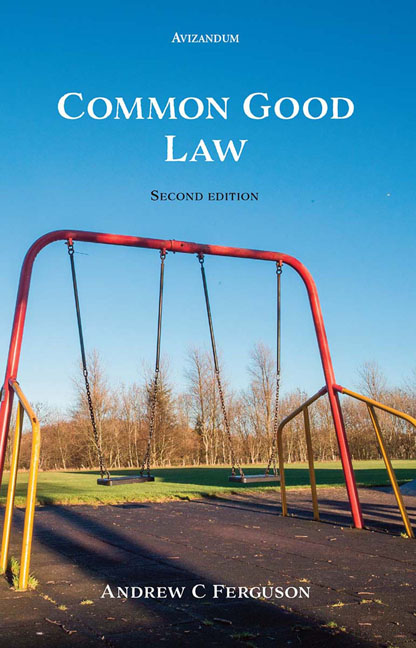Book contents
- Frontmatter
- Contents
- Preface
- Tables of Legislation
- Table of Cases
- 1 Origins and Definitions
- 2 Statutory Framework
- 3 The Administration of the Common Good
- 4 Inalienable Common Good Property
- 5 Classification of Common Good Land
- 6 Appropriation, Alienation and Disposal of Common Good Land
- 7 When Does ‘a Question’ Arise?
- 8 Factors Involved in Allowing Disposal
- 9 Taking a Common Good Case to Court
- 10 Common Good and Community Empowerment
- Appendix I List of Burghs
- Appendix II Disposal, Appropriation and Alienation
- Index
4 - Inalienable Common Good Property
Published online by Cambridge University Press: 20 October 2020
- Frontmatter
- Contents
- Preface
- Tables of Legislation
- Table of Cases
- 1 Origins and Definitions
- 2 Statutory Framework
- 3 The Administration of the Common Good
- 4 Inalienable Common Good Property
- 5 Classification of Common Good Land
- 6 Appropriation, Alienation and Disposal of Common Good Land
- 7 When Does ‘a Question’ Arise?
- 8 Factors Involved in Allowing Disposal
- 9 Taking a Common Good Case to Court
- 10 Common Good and Community Empowerment
- Appendix I List of Burghs
- Appendix II Disposal, Appropriation and Alienation
- Index
Summary
Moveable common good property and other rarities
Most common good cases, and most common good property left today, consist of heritable property of the usual kind: land and buildings. However, it should be recognised that all sorts of things have in the past fallen into the common good, often as a result of the original burgh charter. Oddities such as the right of patronage of a second ministerial charge in the church; the right to hold markets (which, as will be seen, was effectively also an obligation); and petty customs may no longer trouble anyone today. Harbour dues are often a feature of burgh charters, but it is not entirely clear whether they have survived the 1975 reorganisation of local government which gave the statutory responsibility for harbours to regional councils.
Other types of rights which may still be relevant, dependent on environmental factors, are regalia minora such as salmon fishings and the right to collect mussel scalps or other products of the seashore. It will also be interesting to see whether the case of Threshie v Magistrates and Town Council of Annan, where the High Street of Annan, was held to be the responsibility of the burgh for maintenance, and not that of the statutory road trustees for the road between Dumfries and Carlisle of which it formed part, still has relevance in some maintenance dispute in the future.
One type of property which has not featured strongly in a significant amount of case law is moveable property. However, it is quite likely that the larger burghs in particular will have substantial amounts of moveable property - ceremonial robes, antique furniture and even works of art, which may be of substantial value. One could well imagine, for example, the sale of works of art - or even their long-term loan to galleries outwith the burgh - might raise emotive issues in the present day.
Unfortunately, there seems to be only one case which could be said to deal with moveable property as such. In Magistrates of Dumbarton v University of Edinburgh, the original Dumbarton burgh charter had turned up in the estate of a dead antiquarian who had bequeathed it with the rest of his interesting manuscripts to the University of Edinburgh.
- Type
- Chapter
- Information
- Common Good Law , pp. 53 - 72Publisher: Edinburgh University PressPrint publication year: 2020



